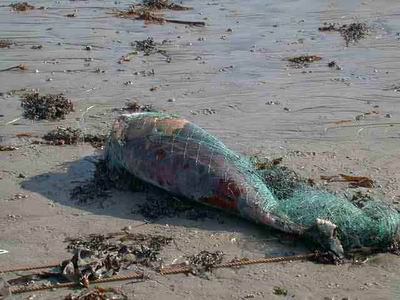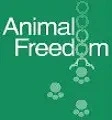What is wrong in the fishing industry?
On the face of it, there would seem to be no objection to the consumption of fish.
Unless one is ethically against the killing of living creatures. Nevertheless, the objections mentioned above concerning the consumption of meat are also valid where the consumption of fish is concerned.
Without starting a discussion on whether fish have a sense of pain or not, it can be said that the current fishing industry uses animal unfriendly catching techniques. For those that are not impressed with the short suffering of fish during the act of being caught, we point to the side catch of mammals such as dolphins in nets meant for tuna. Dolphins are trapped and ensnared in the kilometer-long nets and can do nothing more than wait for death by drowning.  Another objection is that when trawl nets are used, not only the targeted species of the correct size are caught but also 70% of the catch is thrown back overboard. This is because either the fish are too small, the landing of which is prohibited by law, or because the permitted quota had already been reached, or because the species of fish caught happens to be commercially uninteresting. The 70% of the catch that is dumped back into the sea is by then crushed to death, suffocated or otherwise dead. Another objection is that when trawl nets are used, not only the targeted species of the correct size are caught but also 70% of the catch is thrown back overboard. This is because either the fish are too small, the landing of which is prohibited by law, or because the permitted quota had already been reached, or because the species of fish caught happens to be commercially uninteresting. The 70% of the catch that is dumped back into the sea is by then crushed to death, suffocated or otherwise dead.
Also for the environment this method of fishing is detrimental, if not to say disastrous.
The trawl nets ruin the bottom of the sea, which cause the total disruption and destruction of the ecological system for a long time.
The seas and oceans are fished empty and left barren.
Fish are not only caught, but also farmed.
Some salmon, for example, are kept in enormous floating tanks, comparable to industrial farming units. Finally, there are some health objections attached to the consumption of fish. In the seventies, the high level of mercury (quicksilver) present in fish was a hot item. Because of oil pollution, and the dumping of all sorts of waste, including nuclear, in the ocean, the health of fish is poor, and the fish contains hazardous materials. |

